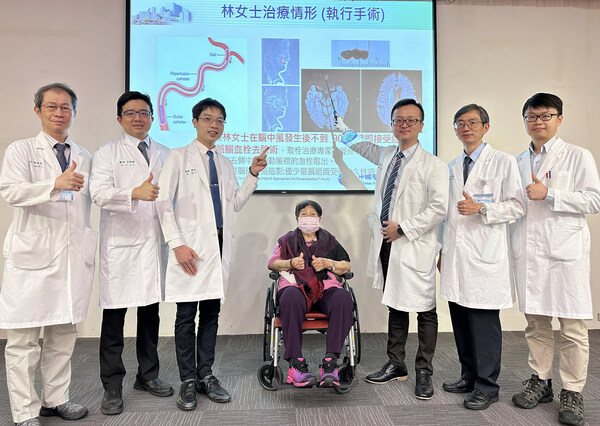TAICHUNG, Taiwan , April 2, 2024 /PRNewswire/ -- The Neurology Department of China Medical University Hospital (CMUH, Taiwan), teaming up with AI Center at CMUH, has established the AISIA (Artificial Intelligence for Stroke Image Analysis) platform, which contains the "NCCT-based Ischemic Stroke Detection System (AISIA-NCCT)" and the "Brain CT Perfusion Analysis System (AISIA-CTP)," both the innovation by AI Center at CMUH. The models analyze NCCT and CTP images to detect acute ischemic stroke, as well as to identify the ischemic core and penumbra. This assist physicians in making decision of acute ischemic stroke management.

When applied within 90 minutes of stroke onset, CMUH's AISIA determined that most of Mrs. Lin's affected brain area was salvageable.
Mrs. Lin, at the age of 79-year-old, was only able to make slight movements of the left limbs but showed (left) unilateral neglect, paralysis of her left face, and significant slurred speech. Dr. Sheng-Ta Tsai, Neurology Department at CMUH, made a preliminary judgment of a right cerebral stroke with a large area of involvement, which was later confirmed by AISIA-NCCT. Then, the extent of the insult was determined using AISIA-CTP. The final diagnosis was ischemic stroke due to right middle cerebral artery occlusion. Mrs. Lin showed good recovery after endovascular thrombectomy, which not only reduced the risk of death associated with large-area strokes but also significantly improved left limb mobility and speech. According to Dr. Sheng-Ta Tsai, the CTP analysis of AISIA was used to determine salvageable (penumbra) and non-salvageable (ischemic core) areas to help physicians determine effective treatment.
AI Center at CMUH points out that AISIA-NCCT implements deep learning to conduct AI model training with the medical information of nearly four hundred patients. This system can determine the presence of acute ischemic stroke in approximately 90 seconds. This model currently outperforms traditional manual interpretation, achieving 92.5% accuracy, 100% sensitivity, and 89.7% specificity in detecting brain ischemia greater than 70mL. Itenhances healthcare professionals' decision-making capabilities regarding stroke diagnosis and treatment. Our study has been published by "Biomedical Signal Processing and Control, Volume 93, 2024." (https://www.sciencedirect.com/science/article/pii/S1746809424001976)
Strokes have a tremendous impact on a patient's physical functioning and can cause death. CT remains one of the staple diagnostic medical imaging technologies. Dr. Chon-Haw Tsai, Director of the Neurology Department at CMUH, stated that the use of brain CTP for diagnosing ischemic stroke and determining the extent of insult requires contrast medium injection is crucial, but it takes considerable time. Also, patients with renal diseases are at risk of contrast-induced nephropathy; the injected contrast medium may cause nausea or vomiting, and when administered to unconscious patients, they can aspirate food material into the lungs, leading to pneumonia. For those patients with contraindication of contrast media injection, AISIA-NCCT can be an alternative evaluation of CTP.
Dr. Ming-Kuei Lu, Neurologist of CMUH, stated, "Stroke presents in two forms: ischemic (80%) and hemorrhagic (20%). Hemorrhagic stroke may be caused by sudden mood fluctuation, blood pressure surge, or vascular rupture from other triggers, leading to bleeding and subsequent damage to brain tissue. Ischemic stroke, however, being more frequent in Taiwan, is caused by cerebrovascular occlusion from atherosclerosis, or the blockage of cerebral artery by secondary clots from heart that results in inadequate blood and oxygen supply and subsequent brain cell damage. Timely identification of acute ischemic stroke and determination of salvageable area is vital to satisfactory treatment and recovery." In this way, the facilitated AISIA platform means a lot for ischemic stroke patients and medical experts as well.
According to the Taiwan Ministry of Health and Welfare's statistical data in 2021, cerebrovascular disease was the fourth most common cause of mortality in Taiwan, claiming more than 12,000 lives. Stroke causes severe health impacts, and its sequelae have been one of the primary causes of adult disability. Patients who survive the first onset usually undergo long-term rehabilitation to restore their capacity for daily living activities. A considerable number of patients become dependent on long-term care as they sustain lifelong disability, causing a heavy burden to society and families.
Media Contact
Carolyn Chen
100709@tool.caaumed.org.tw